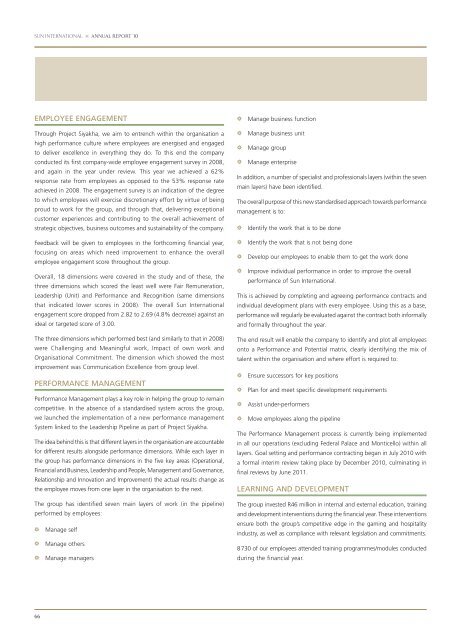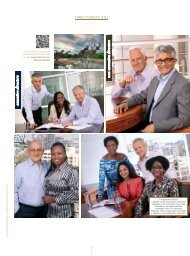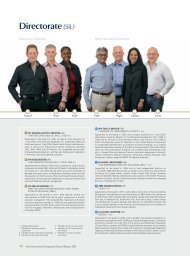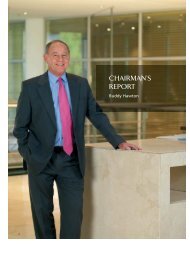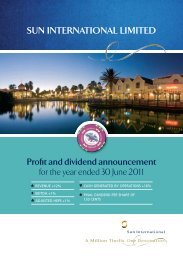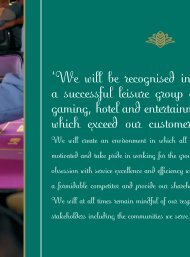PDF 25 MB - Sun International | Investor Centre
PDF 25 MB - Sun International | Investor Centre
PDF 25 MB - Sun International | Investor Centre
Create successful ePaper yourself
Turn your PDF publications into a flip-book with our unique Google optimized e-Paper software.
SUN INTERNATIONAL ANNUAL REPORT ’10<br />
EMPLOYEE ENGAGEMENT<br />
Through Project Siyakha, we aim to entrench within the organisation a<br />
high performance culture where employees are energised and engaged<br />
to deliver excellence in everything they do. To this end the company<br />
conducted its first company-wide employee engagement survey in 2008,<br />
and again in the year under review. This year we achieved a 62%<br />
response rate from employees as opposed to the 53% response rate<br />
achieved in 2008. The engagement survey is an indication of the degree<br />
to which employees will exercise discretionary effort by virtue of being<br />
proud to work for the group, and through that, delivering exceptional<br />
customer experiences and contributing to the overall achievement of<br />
strategic objectives, business outcomes and sustainability of the company.<br />
Feedback will be given to employees in the forthcoming financial year,<br />
focusing on areas which need improvement to enhance the overall<br />
employee engagement score throughout the group.<br />
Overall, 18 dimensions were covered in the study and of these, the<br />
three dimensions which scored the least well were Fair Remuneration,<br />
Leadership (Unit) and Performance and Recognition (same dimensions<br />
that indicated lower scores in 2008). The overall <strong>Sun</strong> <strong>International</strong><br />
engagement score dropped from 2.82 to 2.69 (4.8% decrease) against an<br />
ideal or targeted score of 3.00.<br />
The three dimensions which performed best (and similarly to that in 2008)<br />
were Challenging and Meaningful work, Impact of own work and<br />
Organisational Commitment. The dimension which showed the most<br />
improvement was Communication Excellence from group level.<br />
PERFORMANCE MANAGEMENT<br />
Performance Management plays a key role in helping the group to remain<br />
competitive. In the absence of a standardised system across the group,<br />
we launched the implementation of a new performance management<br />
System linked to the Leadership Pipeline as part of Project Siyakha.<br />
The idea behind this is that different layers in the organisation are accountable<br />
for different results alongside performance dimensions. While each layer in<br />
the group has performance dimensions in the five key areas (Operational,<br />
Financial and Business, Leadership and People, Management and Governance,<br />
Relationship and Innovation and Improvement) the actual results change as<br />
the employee moves from one layer in the organisation to the next.<br />
The group has identified seven main layers of work (in the pipeline)<br />
performed by employees:<br />
66<br />
Manage self<br />
Manage others<br />
Manage managers<br />
Manage business function<br />
Manage business unit<br />
Manage group<br />
Manage enterprise<br />
In addition, a number of specialist and professionals layers (within the seven<br />
main layers) have been identified.<br />
The overall purpose of this new standardised approach towards performance<br />
management is to:<br />
Identify the work that is to be done<br />
Identify the work that is not being done<br />
Develop our employees to enable them to get the work done<br />
Improve individual performance in order to improve the overall<br />
performance of <strong>Sun</strong> <strong>International</strong>.<br />
This is achieved by completing and agreeing performance contracts and<br />
individual development plans with every employee. Using this as a base,<br />
performance will regularly be evaluated against the contract both informally<br />
and formally throughout the year.<br />
The end result will enable the company to identify and plot all employees<br />
onto a Performance and Potential matrix, clearly identifying the mix of<br />
talent within the organisation and where effort is required to:<br />
Ensure successors for key positions<br />
Plan for and meet specific development requirements<br />
Assist under-performers<br />
Move employees along the pipeline<br />
The Performance Management process is currently being implemented<br />
in all our operations (excluding Federal Palace and Monticello) within all<br />
layers. Goal setting and performance contracting began in July 2010 with<br />
a formal interim review taking place by December 2010, culminating in<br />
final reviews by June 2011.<br />
LEARNING AND DEVELOPMENT<br />
The group invested R46 million in internal and external education, training<br />
and development interventions during the financial year. These interventions<br />
ensure both the group’s competitive edge in the gaming and hospitality<br />
industry, as well as compliance with relevant legislation and commitments.<br />
8 730 of our employees attended training programmes/modules conducted<br />
during the financial year.


